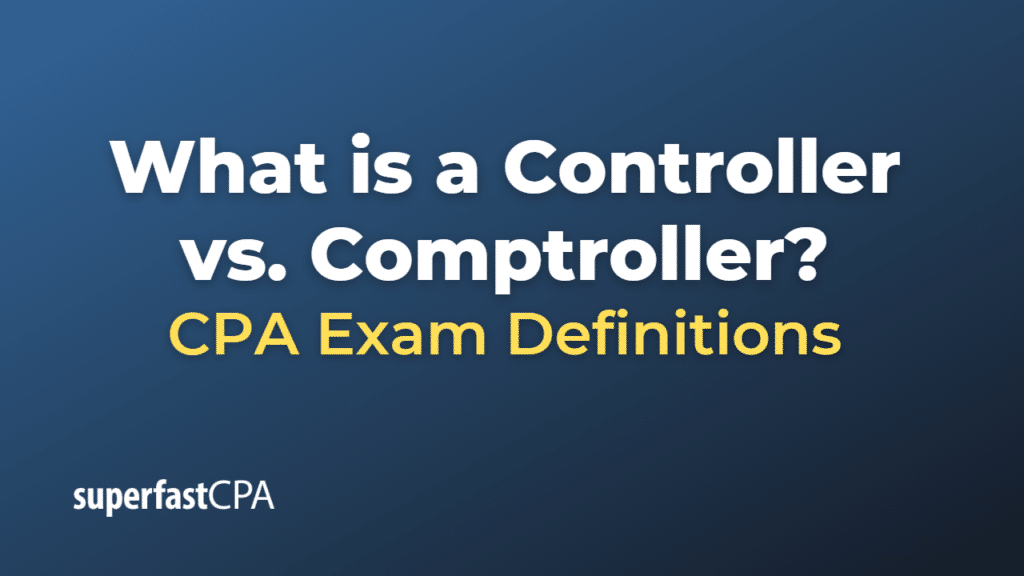Controller vs. Comptroller
The terms “controller” and “comptroller” are often used interchangeably to describe a senior-level finance and accounting position within an organization. Both roles are responsible for overseeing financial reporting, accounting, budgeting, internal controls, and other finance-related tasks. However, there can be some differences in the usage of these terms based on the type of organization and the specific responsibilities involved.
In general, a “controller” is more commonly used in private sector organizations, such as corporations and private businesses. They manage the company’s accounting and financial reporting functions, ensuring the accuracy of financial information, compliance with accounting standards, and the implementation of effective internal controls.
A “comptroller,” on the other hand, is a term more frequently used in government organizations, non-profit entities, or public institutions such as universities. Like a controller, a comptroller is responsible for managing the organization’s finances, ensuring financial reporting accuracy, and maintaining internal controls. However, a comptroller may also have additional responsibilities related to government-specific accounting and financial regulations, as well as providing financial oversight and guidance to other departments within the public organization.
While there are some differences in the usage of the terms “controller” and “comptroller” based on the type of organization, the fundamental responsibilities of these roles are very similar. Both positions play a critical role in ensuring the financial integrity, stability, and transparency of their respective organizations.
Example of a Controller vs. Comptroller
Let’s consider two examples – one for a controller in a private company and one for a comptroller in a government organization.
Example 1: Controller in a private company
Suppose there is a medium-sized manufacturing company called XYZ Manufacturing Inc. The company hires a controller to oversee its finance and accounting department. The controller’s key responsibilities include:
- Preparing and analyzing the company’s financial statements, ensuring their accuracy and compliance with accounting standards.
- Developing and implementing internal controls to safeguard the company’s assets and ensure reliable financial reporting.
- Leading the annual budgeting process, collaborating with other departments to set revenue targets and allocate resources.
- Overseeing tax compliance and planning, working with external tax advisors to minimize tax liabilities.
- Managing the accounting team, providing guidance and support, and addressing training needs.
- Conducting financial analysis to support management decision-making and evaluating the financial implications of various business initiatives.
- Coordinating with external auditors during the annual audit process.
Example 2: Comptroller in a government organization
Now, consider a state government organization that hires a comptroller to manage its financial affairs. The comptroller’s responsibilities would be similar to those of a controller, but with some additional tasks specific to the public sector:
- Preparing and analyzing the government organization’s financial statements, ensuring accuracy and compliance with governmental accounting standards.
- Implementing and maintaining internal controls to protect public funds and ensure reliable financial reporting.
- Developing and monitoring the organization’s annual budget, working with various departments and agencies to allocate resources according to the state’s priorities.
- Ensuring compliance with tax regulations and other government-specific financial rules and reporting requirements.
- Overseeing the accounting team and providing guidance on governmental accounting principles and procedures.
- Conducting financial analysis to support decision-making by government officials and evaluating the financial impact of policy initiatives.
- Coordinating with external auditors for the annual audit of the organization’s financial statements and addressing any audit findings.
In both examples, the controller and comptroller play critical roles in managing the financial affairs of their respective organizations. The key difference lies in the specific context of their work – a private company for the controller and a government organization for the comptroller – which can lead to variations in their responsibilities and the regulatory requirements they must adhere to.













